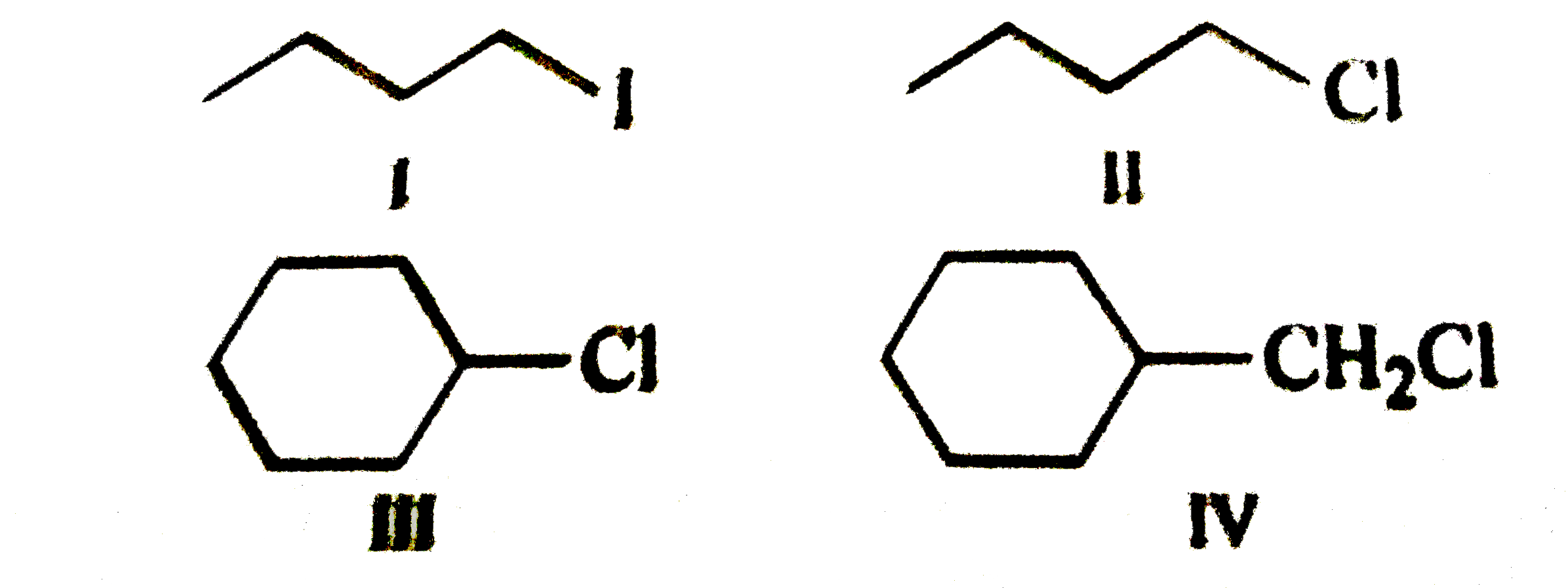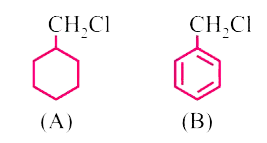Which of the following will not undergo S1N reaction with OH−




The correct Answer is:C
To determine which of the given compounds will not undergo an S1N reaction with OH−, we need to analyze the stability of the carbocations that would form during the reaction. The S1N mechanism involves two main steps: the formation of a carbocation intermediate and the attack of the nucleophile (in this case, OH−) on the carbocation.
1. Identify the Compounds: List the compounds provided in the question. For this example, let's assume we have the following compounds:
- Compound A: CH3CH2Cl (ethyl chloride)
- Compound B: (CH3)3CCl (tert-butyl chloride)
- Compound C: C6H5CH2Cl (benzyl chloride)
- Compound D: CH3CHClCH3 (isopropyl chloride)
2. Determine Carbocation Formation: For each compound, determine the type of carbocation that would form after the leaving group (Cl) departs:
- Compound A: Forms a primary carbocation (CH3CH+2), which is unstable.
- Compound B: Forms a tertiary carbocation ((CH3)3C+), which is very stable.
- Compound C: Forms a benzyl carbocation (C6H5CH+2), which is stabilized by resonance.
- Compound D: Forms a secondary carbocation (CH3C+HCH3), which is relatively stable.
3. Evaluate Stability of Carbocations: The stability of carbocations increases with the degree of substitution:
- Tertiary > Secondary > Primary > Methyl
- Benzyl carbocations are also stable due to resonance.
4. Identify the Compound that Will Not Undergo S1N:
- Compound A (ethyl chloride) forms a primary carbocation, which is too unstable to undergo an S1N reaction. Therefore, it will not react with OH− via this mechanism.
- The other compounds (B, C, and D) form stable carbocations and can undergo S1N reactions.
Conclusion:
The compound that will not undergo an S1N reaction with OH− is Compound A: CH3CH2Cl.
- Compound A: CH3CH2Cl (ethyl chloride)
- Compound B: (CH3)3CCl (tert-butyl chloride)
- Compound C: C6H5CH2Cl (benzyl chloride)
- Compound D: CH3CHClCH3 (isopropyl chloride)
- Compound A: Forms a primary carbocation (CH3CH+2), which is unstable.
- Compound B: Forms a tertiary carbocation ((CH3)3C+), which is very stable.
- Compound C: Forms a benzyl carbocation (C6H5CH+2), which is stabilized by resonance.
- Compound D: Forms a secondary carbocation (CH3C+HCH3), which is relatively stable.
- Tertiary > Secondary > Primary > Methyl
- Benzyl carbocations are also stable due to resonance.
- Compound A (ethyl chloride) forms a primary carbocation, which is too unstable to undergo an S1N reaction. Therefore, it will not react with OH− via this mechanism.
- The other compounds (B, C, and D) form stable carbocations and can undergo S1N reactions.
The compound that will not undergo an S1N reaction with OH− is Compound A: CH3CH2Cl.
Topper's Solved these Questions
Similar Questions
Knowledge Check
- Question 1 - Select One
Which of the following will not undergo S1N reaction with OH−
A(CH3)3CClB C
C DCH2=CH−CH2−Cl
DCH2=CH−CH2−Cl - Question 2 - Select One
Which of the following is not true for SN1 reaction ?
AFavoured by polar solventsB3∘-alkyl halides generally react through SN1 reactionCThe rate of the reaction does not depend upon the molar concentration of the nucleophileD1∘-alkyl halides generally react through SN1 reaction - Question 3 - Select One
Which of the following is not true for SN1 reaction ?
AIt occurs through a single step concerted mechanismBIt is favoured by polar solventsC3∘ Alkyl halides generally react through this mechanismDConcentration of nucleophile does not affect the rate of such reactions
Which of the following alkyl halides will undergo SN1 reaction most readily ?
View SolutionWhich of the following haloalkanes would undergo SN2 reaction faster
 View Solution
View SolutionWhich of the following alkyl halides will undergo SN1 reaction most readily?
View SolutionWhich of the following alkyl halides will undergo SN1 reaction most redily ?
View SolutionWhich of the following alkyl halides will undergo SN1 reaction most redily ?
View Solution


